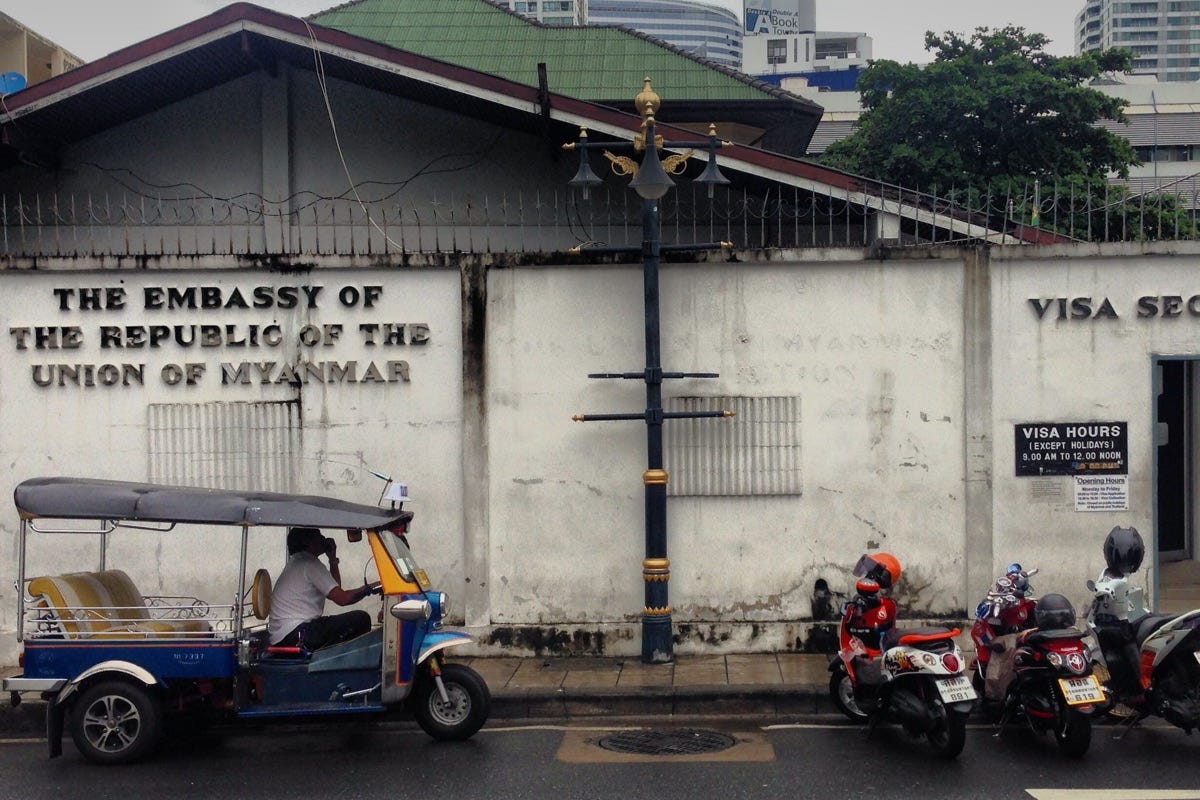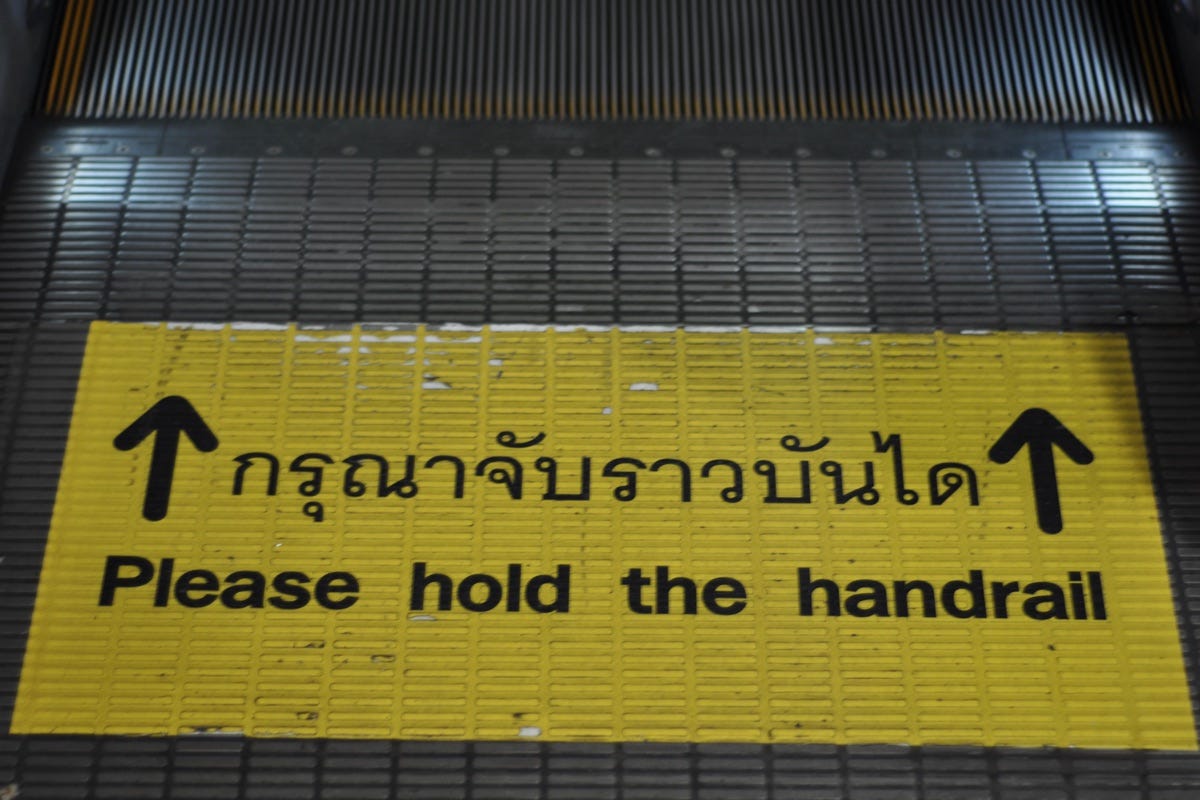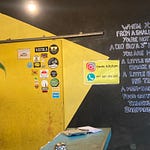On my second trip to Laos, in the mid-1990s, I was on a slow boat from Huay Xai to Luang Prabang. If you’d like to read about a competitive traveller I met on the trip, read this. Today’s piece though isn’t a gripe about annoying travellers.
A few hours south of Huay Xai, I guess about halfway to Pak Tha, the boat moored at a small village. “All foreigners off please,” the boat dudes asked, “but bags stay on board.” The half dozen or so of us peeled ourselves off the deck and roof and ambled up into the hamlet. None of us knew what was going on.
Do as we say, not as we do. Photo: Stuart McDonald.
At the time, travel in Laos wasn’t the free-wheeling scene it was to become. Visas had only recently dropped in price from US$100 for a week and travellers remained a curiosity. Where you could go remained restricted, and the village had an immigration checkpoint. We formed a motley queue as a uniformed but diminutive Lao guy, sitting at a desk in a bamboo hut, wrote our names down.
There was no request for passports. When it came to my turn, I missed what he said and replied “Sorry?” The guy dutifully wrote down Mr Sorry.
Names recorded, it was back to the boat to continue our trip downriver. I like to think that somewhere in the village there’s a hut full of reams of paper, each filled with his careful script. Somewhere, on a page not yet eaten by termites, one reads “Mr Sorry.”
Papers, please. The Mekong from Pak Tha, Laos. Photo: Stuart McDonald.
I’m not going to venture too far into the pointlessness of that little exercise. Thailand ex-pat residents will be familiar with the 90-day reporting rule, something I remember from my years there. At the now-gone office on Soi Suan Phlu, a room held metric tonnes of paper slowly gathering dust. After doing it once, I didn’t bother again—even by Thai governmental processes, it seemed asinine. I remained in Thailand for another four or five years and never got pulled up on my intransigence. Who knows if they’ve got an APB out on Mr Sorry.
At the time I was working at the Australian Embassy in their education department. I was a “locally engaged staff,” meaning I sat in a weird middle ground between local staff and the staff sent from the motherland. The job paid better than English teaching, but at least that came with a work permit—something the embassy refused to do. Instead, they had some weird dodge which had me spending plenty of time at Suan Phlu immigration.
Storms ahead. Photo: Stuart McDonald.
Spend long enough at immigration offices and you see all sorts of crazy stuff. On one occasion there was a fight between an enraged French guy and officers. They took him mid-rant to another room where, out of sight, I could hear the Thai officers yelling at him.
“Shut up now or I hit you.”
Happy days.
Immigration is a weird beast. At worst it is the public face of a nation’s racism and xenophobia, with rules dictated by the girth of your wallet—and the colour of your skin.
Simple rules are easier to follow. Photo: Stuart McDonald.
I once had a heated argument with an immigration officer entering the USA from Canada. For my efforts I was strip searched and given the ahhh full hands-on examination. After that, I stopped arguing with immigration. I guess if the Thais had picked me up for skipping 90-day reporting, or Laos had jailed me for supplying a false name, I’d have avoided doing those things too. Thankfully neither did.
There is a bizarre story from when I was living in Bangkok. A friend of a friend was picked up for reasons I don’t remember. Unable to furnish his passport (he had lost it some years earlier), he was sent to immigration detention. He then entered this weird circuitous journey between detention and a holding centre near the airport. I don’t remember why he kept getting sent back and forward between the two, but he was in the circuit for months. On one of the runs, his transport pulled up at the side of the road and the officers told him to get out and go. He did. Who wouldn’t? As far as I know, he is still in Thailand—I have no idea if he ever got around to getting a passport again.
It is enough to make you want to stream. Photo: Stuart McDonald.
It was one of those weird stories, and my memories are foggy on the details—I’ll see if I can track down the full tale for another piece. I mention it though, on behalf of someone he met on his trips back and forward. An African guy (I don’t remember his nationality sorry) who had been in lockup for over six years. His country had no diplomatic office in Thailand, and he had no money. The guy who was released on the side of the street? He was white.
In the midst of the pandemic, there was a rash of foreigners deported from here in Indonesia. Deportations are not all that rare, but there seemed to be on the rise. There were so many I considered starting a newsletter called the Deportation Daily.
Bangkok is great for cycling around in circles. Photo: Stuart McDonald.
The reasons were typical and not all that unexpected. Crime—particularly drugs—was a big one, followed closely by working illegally. Then there was a whole bunch of weirder and whacky ones. A guy rode a scooter off a pier at Padang Bai as a social media prank, but social media bit him back hard and he was out. There were others, some even more batty. I think in part this reflected a combination of two things. First, people locked indoors for prolonged periods were losing a few marbles. Secondly, the people who were willing to try recreational travel in the middle of a global pandemic sometimes had a different take on behaviour.
In the end, I didn’t bother with the newsletter idea. It felt a bit ghoulish in a “dancing on others’ graves” kind of a way. The stories though keep coming. For every kooky story, however, was almost impossible to defend deportations. Journalists and activists continued to be targeted across the region. One I know was deported from a country in the region simply because the immigration officer responsible had a quota to meet. The officer apologised to my friend, explaining his hands were tied by his seniors. The friend went without a peep, hoping to get back in after a spell. He’s still cooling his heels offshore. When the targeted person is hard to harass, their family may earn a closer look.
A whack for each day of visa overstay. Photo: David Luekens.
Of course, having abhorrent immigration rules are the right of every country. The United Kingdom, Australia and the USA all excel at horrific policies. The rules are opaque by design, a catchall to provide a means to offload those they (or their citizens) don’t want. Long it has been this way.
This has come into sharp focus as the world tries to re-open during a down-dip in the pandemic. The ever-changing rules for entry have required a degree of intestinal fortitude that has taken some by surprise. The complaints from travellers have been incessant. Why is this so complicated, accompanied of course by the entitled cry of “don’t they want tourists?”
For many nationals though, like the man in Bangkok immigration detention for six years, the rules have always been this way.
Couchfish is 100 per cent independent and reader-supported. If you’re not already a subscriber, and you’d like to show your support, become a paying subscriber today for just US$7 per month—you can find out more about Couchfish here—or simply share this story with a friend.
Don’t forget, you can find the free podcasts on Apple, Pocket Casts and Spotify as well as right here on Couchfish.



















Share this post